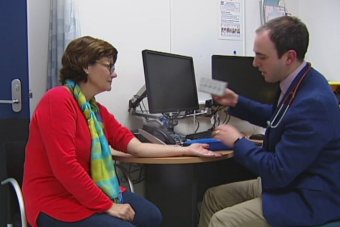 Victorian patients at high risk of infection could soon be able to use more potent and effective drugs, following the opening of the state’s first antibiotic allergy testing centre.
Victorian patients at high risk of infection could soon be able to use more potent and effective drugs, following the opening of the state’s first antibiotic allergy testing centre.Doctors at the Austin Hospital’s antibiotic de-labelling clinic said of the 20 per cent of people who came to hospital believing they had an allergy to antibiotics, up to 90 per cent of them did not.
Clinic coordinator Dr Jason Trubiano said people would sometimes have had a strange reaction in childhood that was mislabelled as an allergy.
“This can be very limiting if, for example, they think they are allergic to penicillin and they have cancer or need a liver transplant, if you’re allergic to penicillin it potentially excludes many drugs,” he said.
“When people are labelled as allergic we often have to use second-line drugs.
“Any infection in a patient that has a lowered immune system is at risk and in that situation we want to give them the best antibiotics, so if we can remove a penicillin allergy label and give them the penicillin antibiotic to a bug that’s going to work against it, then we want to do that at all opportunities.”
The clinic has opened in collaboration with Victoria’s Peter MacCallum Cancer Centre and is the second of its type in Australia.
Patients with recurrent infections or a high risk of developing one – such as cancer and organ transplant patients – undergo a detailed consultation of their medical history, then an extensive skin-prick test using a few drops of the antibiotic.
If there is no allergic response, patients are given a small amount of the drug under the skin and if the results are still negative, they are carefully monitored after being given an antibiotic tablet.
If all the tests are completed with no reaction, the patient is given the all-clear.
Dr Trubiano said he was in the early stages of developing a simpler test for antibiotic allergies.
“We’d like to make it as easy as possible in the future and one way would be able to diagnose this in a test tube and we’re looking at trying to measure a patient’s white blood cell response or immune response to antibiotics in a test tube,” he said.
He also stressed it was just as important to establish if a person’s allergy label was correct, because 50 per cent of the very severe and rare adverse drug reactions that needed hospitalisation were caused by antibiotics.
Of those, he said one in five patients would die from their reaction.
First line drugs critical for healthcare
Austin Health’s head of infectious diseases, Professor Lindsay Grayson said incorrect allergy labels hurt the healthcare system generally, by exasperating emerging bacterial resistance to antibiotics.
“It’s really critical that we can use the first line [drugs] whenever we possibly can,” he said.
“Second-line drugs are either because they don’t work so well or because they have a higher rates of side effects and toxicities … and patients are less likely to take them accurately and therefore resistance can emerge.
“Antibiotic resistance, or superbugs, is now a worldwide problem – in fact, recently the Chief Medical Officer of the United Kingdom likened its impact to that of terrorism around the world … so it’s crucial that we use first line agents where possible.
“They’ll work better, they’re quicker and they’re safer.”
To suddenly be able to know that I could have penicillin was almost life-changing.
Chrissie Hopper
Dr Trubiano has so far tested 60 patients and only one has returned a positive result for an antibiotic allergy.
“They’re very happy that when they go to their GP the next time when they want to have penicillin for their chest infection, they can take that safely, so people are very positive, we’ve had great responses from our patients so far,” he said.
“That’s what we get into [medicine] for to do, to make a significant differences, and I think this is certainly an opportunity to make a big impact on patient level care which is great.
Chrissie Hopper, 63, said she was “absolutely over the moon” to be told she could use penicillin again, more than five decades after being told she was allergic because of a childhood reaction.
She has suffered from recurring pneumonia and recently was hospitalised for eight days after having to be treated with second-line drugs because of her penicillin “allergy”.
“To suddenly be able to know that I could have penicillin was almost life-changing,” she said.
“I think it’s absolutely brilliant and I was just so fortunate that I got referred here … so I do hope people who have really serious problems can come and be tested and find out like me that they’re not allergic after all these years.”
